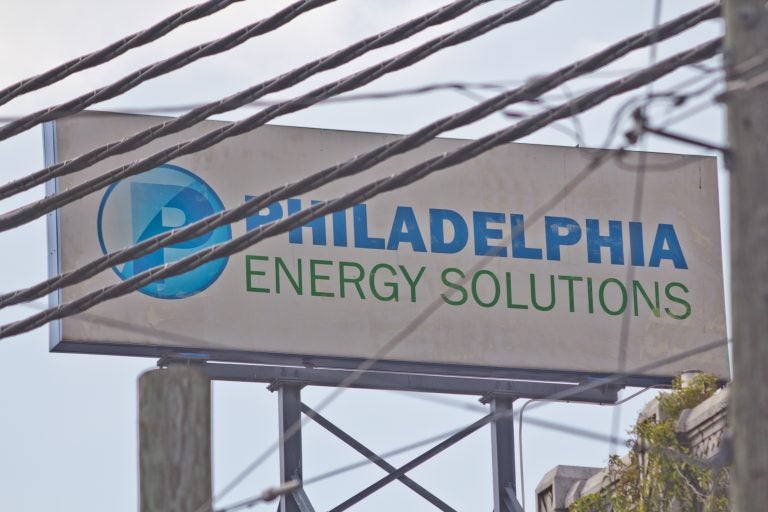U.S. trustee lodges objection to refinery owner’s Chapter 11 reorganization plan
Andrew R. Vara, charged with administrative oversight of the bankruptcy, says the plan has issues with discharge claims, release provisions, statutory fees.

Philadelphia Energy Solutions refinery. (Kimberly Paynter/WHYY)
Updated 12:15 p.m
A major new objection to Philadelphia Energy Solutions’ reorganization plan, which includes the sale of the refinery complex in South Philadelphia, might complicate its scheduled Feb. 6 confirmation by U.S. Bankruptcy Judge Kevin Gross.
Andrew R. Vara, the United States Trustee for Region 3, who is charged with administrative oversight of the bankruptcy proceedings, says the PES Chapter 11 plan should not be approved as written because it contains provisions that are “inconsistent with the Bankruptcy Code” in regard to discharge claims, release provisions and statutory fees, according to documents filed Friday with the bankruptcy court in Wilmington.
“U.S. Trustee respectfully requests that this Court issue an order denying confirmation of the Plan, and/or granting such other relief as this Court deems appropriate, fair and just,” Vara says in the document.
The trustee’s objection comes ahead of Monday’s deadline for creditors to protest the plan and vote on it. A committee of unsecured creditors has already called for rejection of the PES plan because it does not represent the best opportunity — the $240 million bid for the refinery complex declared to be the winner of the Jan. 17 auction was not the highest bid, the committee argues, and did not include plans to reopen the refinery. The committee’s attorneys have subpoenaed Hilco Redevelopment Partners — the Chicago-based developer of rehabilitated industrial properties declared winner of the auction — as well as PES and investment bankers to appear for depositions to explore the reasons behind the sale to Hilco.
In his filing with the bankruptcy court Friday, Vara, the U.S. trustee, does not question the sale to the winning bidder. And PES can amend its reorganization plan before the confirmation hearing.
Pressure on Philadelphia Energy Solutions has intensified outside the court, too. Hundreds of union members rallied Thursday outside City Hall, calling for refinery operations to be preserved at the 1,300-acre complex.
Pro-refinery factions maintain that deed restrictions in the 2012 buyer-purchase agreement between PES and the refinery’s previous owner, Sunoco, could complicate the sale of the refinery site to Hilco because they limit its redevelopment to refinery, energy or chemical uses. According to city officials, Hilco’s plans are to redevelop the site into warehouses and a logistics and distribution center.
But court filings show that the deed restrictions were taken into consideration by PES before it chose Hilco as the property’s next owner — through a consent agreement signed two days before the Jan. 17 bankruptcy auction. In that consent order and agreement between PES and the Pennsylvania Department of Environmental Protection, the regulatory agency agrees to eliminate those restrictions.
“DEP certainly does not object to modifications to previous agreements and deed restrictions to accommodate alternative uses at the site,” Virginia Cain, a media representative for the agency, said Friday. “DEP is flexible regarding alternative uses of the property, and we agreed to language, in the latest consent order and agreement with PES, which makes that flexibility explicit.”
The August 2012 buyer-purchase agreement between Sunoco, PES and the DEP allows for future industrial or commercial uses of the property while excluding “schools, nursing homes and other residential-style facilities and publicly accessible recreational uses.” But it does narrow the definition of construction and development allowed in the area as “actions or projects” “related or associated” to the refinery, or related to the “refinery business, the energy industry generally and the chemical industry.”
The Jan. 15 consent order and agreement, filed in U.S. Bankruptcy Court, states that the new owner of the site “may seek redevelopment of the Facility for alternative purposes, including other commercial or industrial uses,” and that DEP “agrees to work as expeditiously as possible” in the approval, if required, of a commercially reasonable soil-management work plan or similar approvals that permit and are otherwise consistent with any such redevelopment.
The document was produced before the auction, letting interested bidders know that they could construct and develop the site in projects that did not include continuing refinery operations.
When contacted Friday, a media representative for Energy Transfer did not confirm whether Sunoco, with which it merged in 2012, had agreed to amend the deed.
Since 2003, Sunoco has been working to remediate historic soil and groundwater contamination at the site, which has operated as a refinery since the 1860s. In 2012, when Delaware’s Carlyle Group entered a joint venture with Sunoco to form Philadelphia Energy Solutions, that purchase agreement established that any new contamination generated by the refinery after the deal was finalized in 2013 would be PES’ responsibility.
The Energy Transfer representative referred WHYY’s inquiry to Philadelphia Energy Solutions. In an email, PES chief executive Mark Smith wrote that he had no comment on the issue.
Jonathan Lipson, who teaches bankruptcy law at Temple University’s Beasley School of Law, said that, technically, if deed restrictions like these could be monetized, then the sale to Hilco Redevelopment could still take place if a dollar amount is paid to clear it. Whether that can be done in this case is a question the bankruptcy judge will have to consider, which could end up delaying the process. Lipson said PES may also try to include a way to solve the issue in its Chapter 11 reorganization plan.
“I have to imagine that PES and the professionals who are working for them knew about this restriction,” he said. “They were not surprised by this. And so they must believe that there’s a way that they could do it.”
City officials and members of the Refinery Advisory Group — formed in the aftermath of the explosion and fire at the refinery last June that spurred PES to shut down operations and file for Chapter 11 — were familiar with the deed restrictions. In August, David Brown, of the DEP’s Bureau of Environmental Cleanup & Brownfields, presented an overview of the history and regulations governing the cleanup of the refinery site and mentioned PES’ obligations, including the deed restrictions. At that time, Brown said he anticipated that if the refinery was permanently shut down, the cleanup process would be affected.
“All the work that has been going on in the last 30 years has been under conditions of an operating refinery,” Brown said at the August public meeting. “That has meant that there have been some areas that have not been investigated.”
Dismantling the refinery would require Evergreen Resources, which is managing the cleanup for Sunoco, to come in and investigate parts of the complex that were not among the 10 areas included in the cleanup plans because it was not safe to drill there or make holes to take samples. That would probably expand the cleanup responsibilities for Sunoco and postpone a 2020 deadline for the cleanup.
In an interview on Friday, Brown said the steps forward are still not clear, but that there will have to be negotiations between Hilco or any new owner, PES and Sunoco on terms of the cleanup.
“There are still a lot of unknowns on the horizon for this site, and therefore we’re not able to definitively outline the specific next steps,” he said. “Regardless of the future use however, one important first step will be a meeting that brings together stakeholders to ensure a path moving forward is protective of human health and the environment.”
—
This article was updated to reflect new filings in U.S Bankruptcy Court.
WHYY is your source for fact-based, in-depth journalism and information. As a nonprofit organization, we rely on financial support from readers like you. Please give today.






